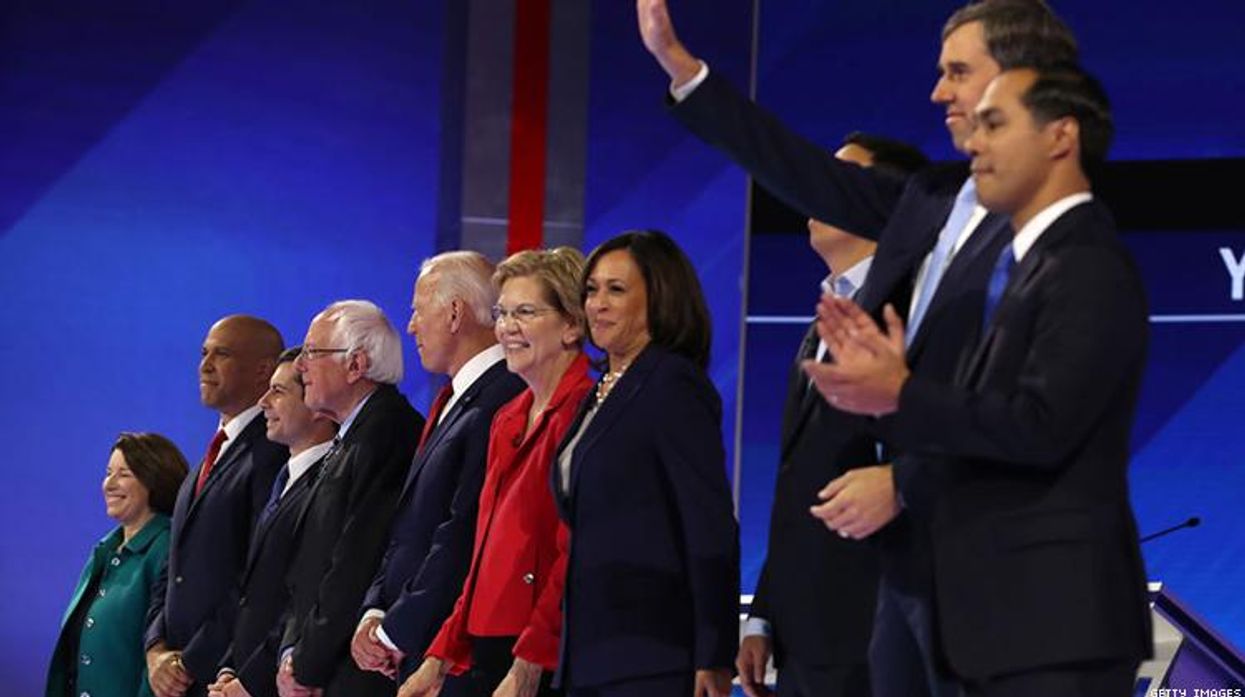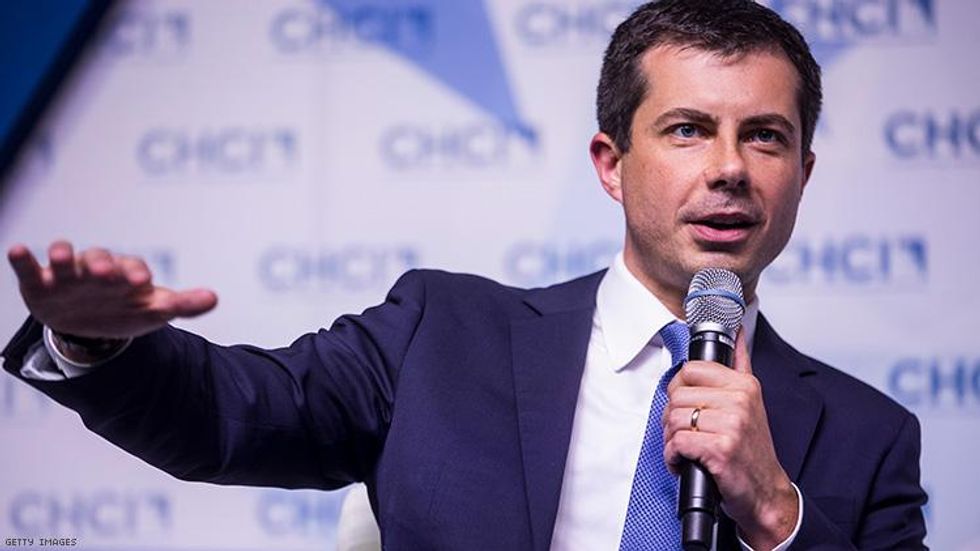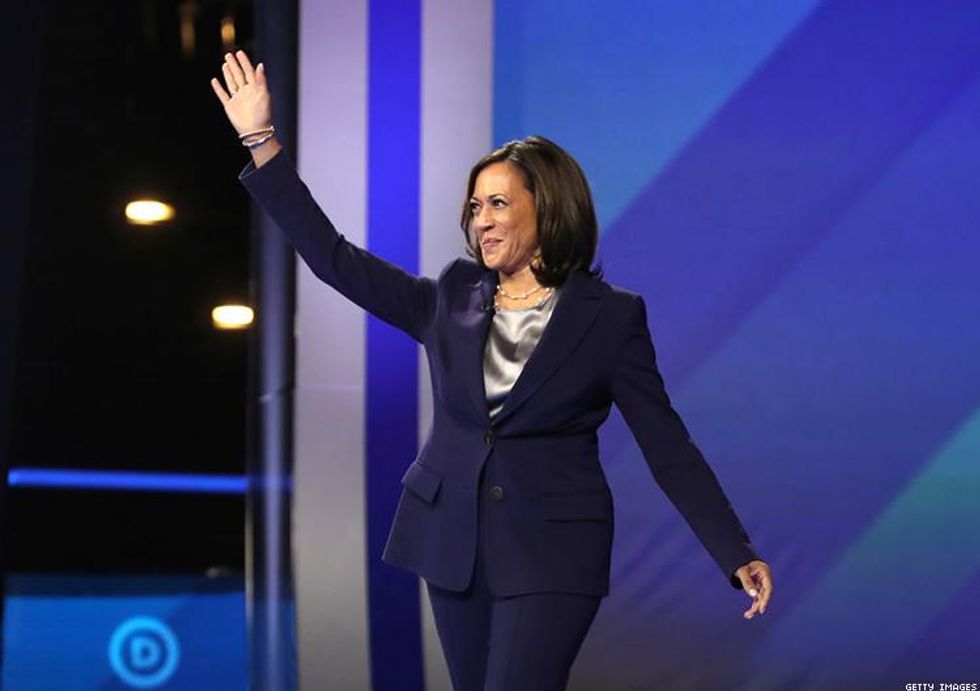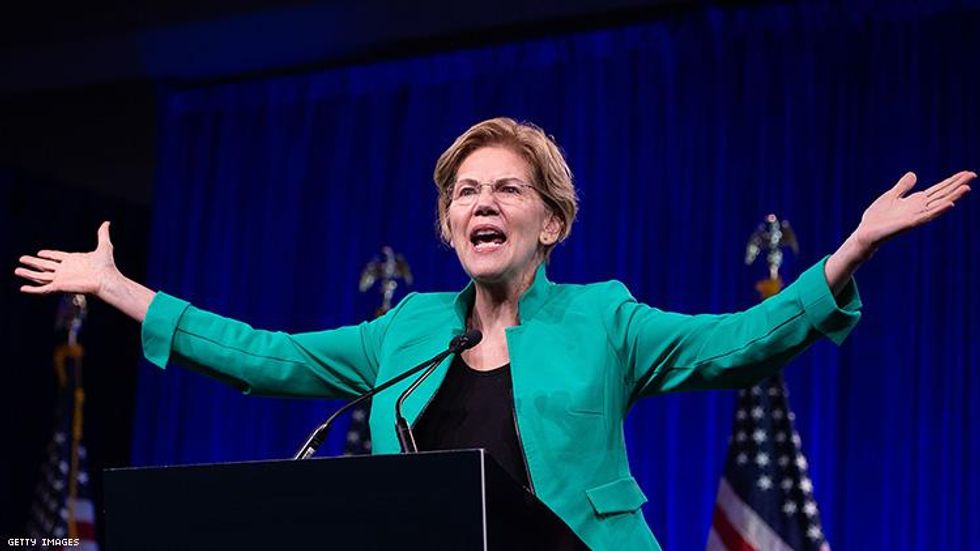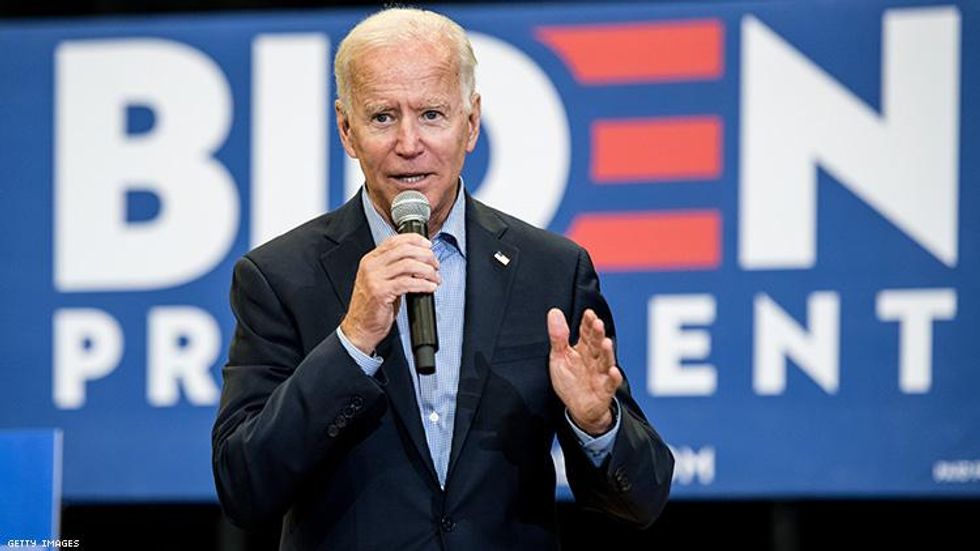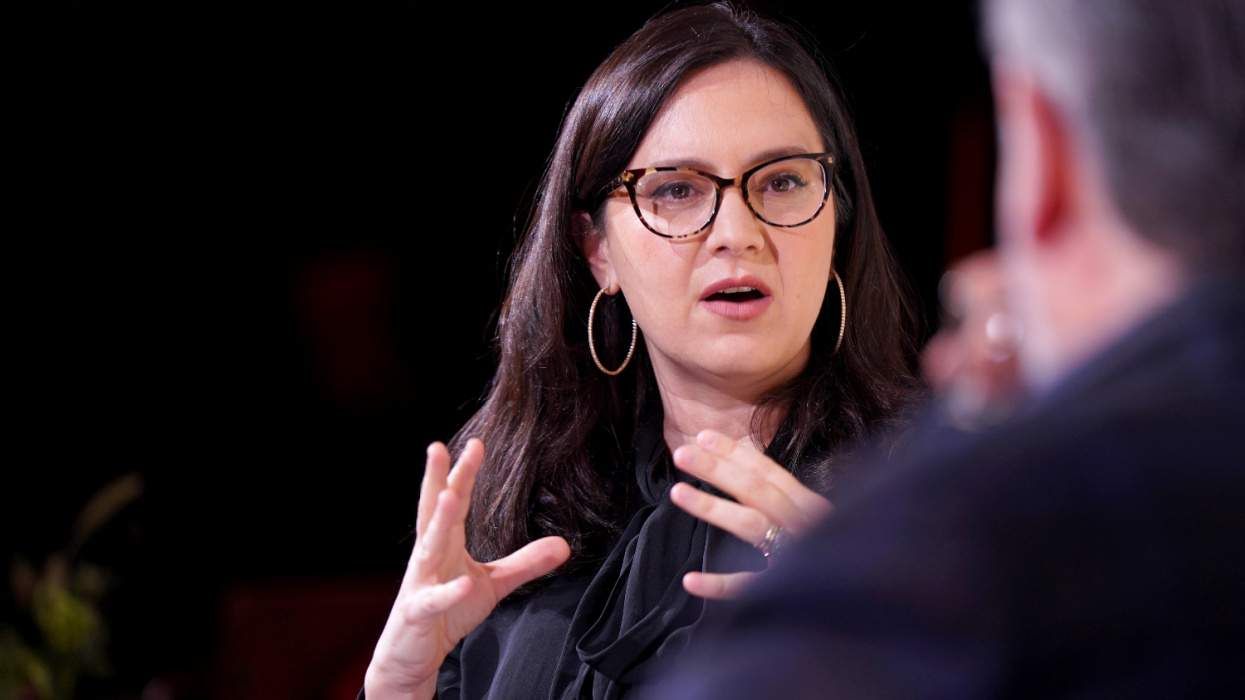Thursday night's Democratic presidential debate was again one that gave short shrift to LGBTQ issues.
The 10 candidates on the stage at Texas Southern University in Houston are all LGBTQ allies, and one of them, Pete Buttigieg, is gay. But their questioners from ABC News and Univision didn't ask about LGBTQ issues or, for that matter, a plethora of other matters, including reproductive rights and other things that primarily affect women. Not that the issues they focused on weren't important -- they encompassed climate change, health care, education, trade, gun reform, racism, criminal justice, foreign policy, and much more. Some activists, however, are calling the debate another missed opportunity.
LGBTQ issues came up only when Buttigieg, the mayor of South Bend, Ind., fielded the final question put to each candidate, about situations where they had faced setbacks and shown resilience.
Pete Buttigieg
"As a military officer serving under 'don't ask, don't tell,' and as an elected official in the state of Indiana when Mike Pence was governor, at a certain point, when it came to professional setbacks, I had to wondering whether just acknowledging who I was, was going to be the ultimate career-ending professional setback," he said. But he came out during his reelection campaign in 2015, and he was reelected, rewarded for trusting voters who in turn put their trust in him.
"I came back from the deployment and realized that you only get to live one life," he said. "And I was not interested in not knowing what it was like to be in love any longer, so I just came out. I had no idea what kind of professional setback it would be, especially because inconveniently it was an election year in my socially conservative community.
"What happened was that, when I trusted voters to judge me based on the job that I did for them, they decided to trust me and reelected me with 80 percent of the vote. And what I learned was that trust can be reciprocated and that part of how you can win and deserve to win is to know what's worth more to you than winning."
With Buttigieg's statement being the sole mention of LGBTQ issues Thursday night, GLAAD was quick to comment on the lack of attention these matters have received. "The Trump administration has spent the last three years rolling back rights for LGBTQ and other marginalized communities, and it's imperative that LGBTQ people and the issues affecting our lives and our families not be overlooked in this presidential election," said Sarah Kate Ellis, president and CEO of GLAAD, in a press release. "Next week's LGBTQ Forum in Iowa will correct the pattern we have seen in the first round of debates that have left LGBTQ people largely out of the conversation."
GLAAD, One Iowa, The Advocate, and The Gazette, a Cedar Rapids, Iowa, newspaper, are sponsoring the forum to be held September 20 at Coe College in Cedar Rapids. Candidates scheduled to appear include Buttigieg; former Vice President Joe Biden; U.S. Sens. Elizabeth Warren, Kamala Harris, Amy Klobuchar, and Cory Booker; former U.S. Rep. Joe Sestak; current U.S. Rep. Tulsi Gabbard; former San Antonio Mayor and Housing and Urban Development Secretary Julian Castro; and author Marianne Williamson.
The lineup of qualifiers for Thursday night's debate was somewhat different -- missing Sestak, Gabbard, and Williamson, but including former U.S. Rep. Beto O'Rourke, current U.S. Sen. Bernie Sanders, and businessman Andrew Yang.
Questioned by ABC's George Stephanopoulos, Linsey Davis, and David Muir, and Univision's Jorge Ramos, the candidates wrangled over how best to provide all Americans with health care coverage and staked out their positions on a variety of other issues, while getting in some zingers at Donald Trump and his administration.
Kamala Harris
There was extensive discussion of health care, with Sanders and Warren touting Medicare for all; Harris offering a Medicare for all plan mixing public and private options; Biden saying the nation should instead build on the Affordable Care Act, enacted when Barack Obama was president, and let people keep their private insurance if they like it; Klobuchar calling for a public option under the ACA; Buttigieg endorsing Medicare for those who are uninsured or inadequately insured; and more.
Warren noted that private insurers are often problematic, saying, "I've actually never met anybody who likes their health insurance company." Harris said she thought all the candidates had good intentions about providing coverage for everyone, but they also needed to discuss Trump, who's been trying to dismantle the ACA ever since taking office. "If we don't get Donald Trump out of office, he's going to get rid of all of it," she said.
Harris also got cheers early on when she directly addressed Trump, saying, "The only reason you've not been indicted is because there was a memo in the Department of Justice that says a sitting president cannot be charged with a crime." She said the American people are better than this, and she will work to unite them. "And now, President Trump, you can go back to watching Fox News," she added.
O'Rourke, whose hometown of El Paso, Texas, was recently the site of a mass shooting, came out strongly for requiring people who own assault weapons to sell them to the government in a mandatory buyback. "Hell, yes, we're going to take your AR-15, your AK-47," he said. "We're not going to allow it to be used against our fellow Americans anymore."
Elizabeth Warren
Klobuchar said she would start with a voluntary buyback program but also noted that bills for universal background checks and other gun control measures are being blocked by Senate Majority Leader Mitch McConnell. "We've got to send a message to Mitch McConnell," she said. "We can't wait until one of us gets in the White House. We have to pass those bills right now to get this done."
Booker noted that a huge majority of Americans support background checks and gun licensing, but there has been a "crisis of empathy" preventing wide mobilization on these issues. "We get this done by having a more courageous empathy, where people don't wait for this hell to visit upon their communities," he said.
On education, with the candidates endorsing better funding for public schools and better pay for teacher, and addressing the racism and poverty that interfere with students' success, Buttigieg had an applause line when he said, "Step one is appoint a secretary of Education who actually believes in public education." Warren, a former public school teacher, went a step further and said she would appoint a secretary of Education who had actually taught in public schools. Booker said that when he was mayor of Newark, N.J., he oversaw the raising of teacher salaries and that public schools there have improved student outcomes.
Booker, a vegan, also provided one of the night's moments of levity when Ramos asked him if he thought all Americans should follow his diet, as scientists have called meat production one of the sources of environmental degradation. "First of all, I want to say no. Actually, I want to translate that into Spanish: no."
Joe Biden
The debate did not feature the expected clashes between Biden, the front-runner, and Warren, who has been rising in the polls. This was the first time they had shared a debate stage, as previous debates have been two-night affairs, with a different set of candidates each night. The biggest conflict with Biden came with Castro during the health care discussion, when Castro accused the former vice president of not remembering what he said two minutes ago. Some observers took this as a dig at Biden's age (he's 76). But the much younger Castro said after the debate that it was simply a critique of Biden's policy stance.
For more on the debate: The Washington Post has a transcript on its website. NBC News and CNN are both offering analysis and fact-checking.
